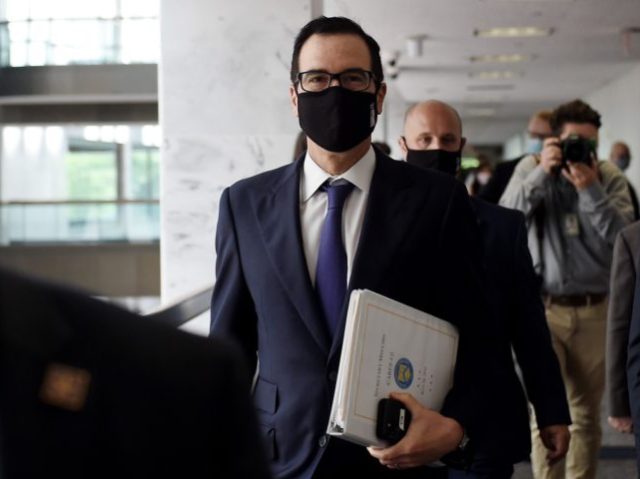Senate Republicans will include an extension of the federal government’s enhancement to state unemployment benefits in their next coronavirus relief package, Treasury Secretary Steven Mnuchin said Thursday.
Mnuchin said in an interview with CNBC that the bill, which has been negotiated between Capitol Hill Republicans and the Trump administration, will redesign the federal government’s boost to jobless benefits so that they provide a typical worker with 70 percent of his or her income.
Senate Majority Leader Mitch McConnell is expected to release the outline of the bill Thursday.
The federal government has been contributing an additional $600 to state benefits. That has meant that many workers are eligible to receive more from unemployment than from wages. That creates a disincentive for those out of work to return to payrolls, Republicans have warned.
The enhanced benefits were due to expire at the end of July. But that expiration date was set back in March, a time when many lawmakers believed the economic impact from the pandemic would be short-lived. On Thursday, the Labor Department said an additional 1.4 million Americans had applied for unemployment benefits last week and the insured unemployment rate is around 11 percent. The total number of Americans on traditional unemployment is around 16 million, a decrease of around one million from the previous week’s revised level.
Some Republicans sought to let the enhanced benefits expire, arguing that this would reduce unemployment by removing the disincentive to work.
An opinion piece published in Breitbart News argued this week argued for an extension of the benefits at a lower level, eliminating the disincentive but keeping incomes for the unemployed higher than they would be under state plans, which typically pay around 50 percent of wages. That appears to be the approach the Trump administration and Senate Republicans have adopted.
Allowing the program to expire altogether risked sending the economy back into a recession by slashing the incomes of households that have suffered job losses due to the pandemic. Not only would spending by households receiving unemployment have dropped, so would spending by households fearing future job losses. That spending decline would translate into lower sales by businesses, trigger more layoffs, setting off a vicious cycle of economic decline.
A reduction of the flat payment from $600 to $200 would probably accomplish the goal of reducing the enhancement to provide a 70 percent wage replacement rate. Some have argued for a more sophisticated system that would include a sliding enhancement based on actual wages but that would be hard to implement given the aging technology used to by states to calculate benefits. So it is likely, at least in the near term, that a flat rate will be maintained.
There may still be room for the enhancement to rise to allow for a 90 percent replacement rate, essentially splitting the difference between Democrat proposals to maintain the $600 bonus and the GOP proposal. A $400 flat rate would likely come close to 90 percent.

COMMENTS
Please let us know if you're having issues with commenting.